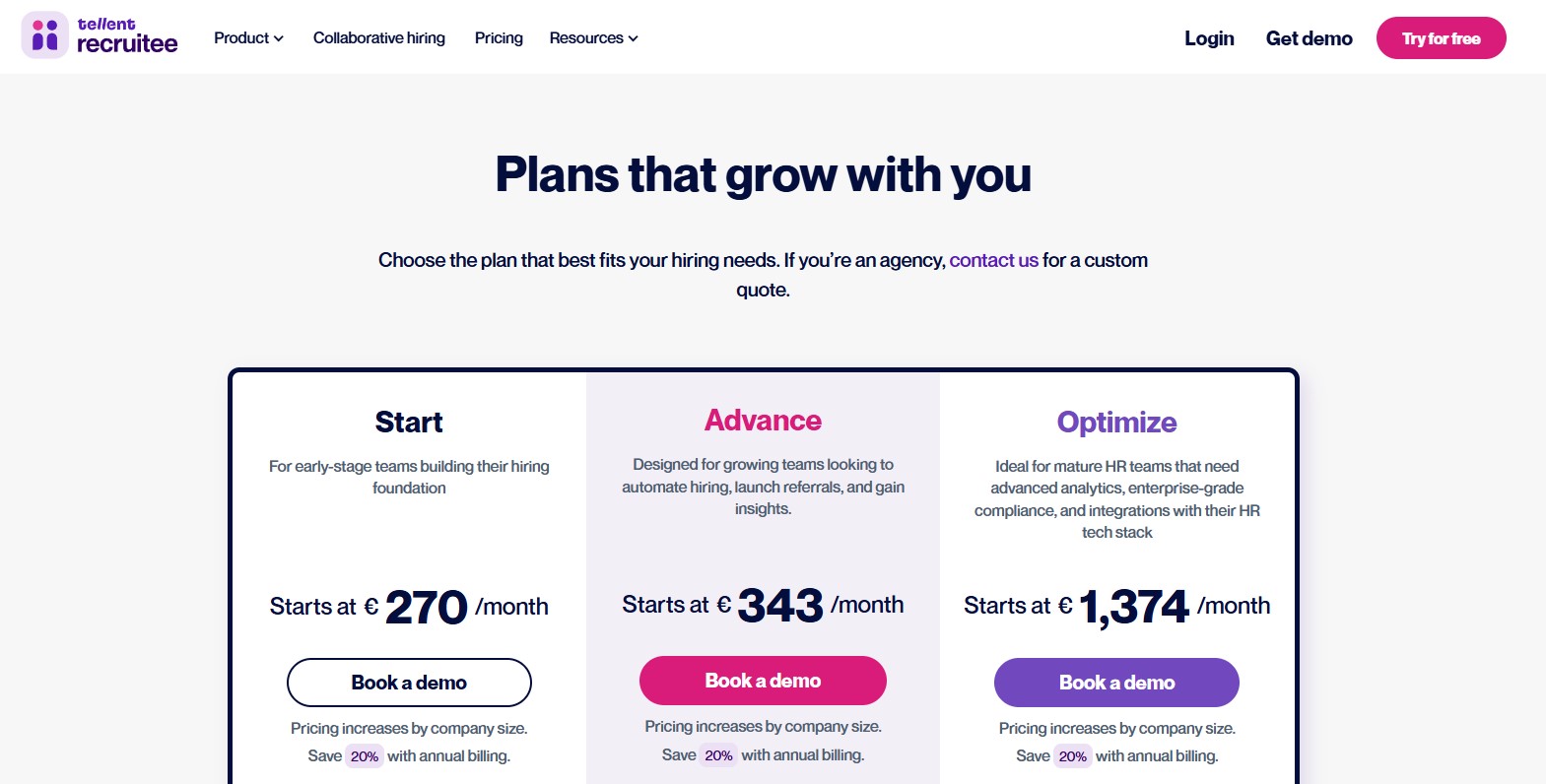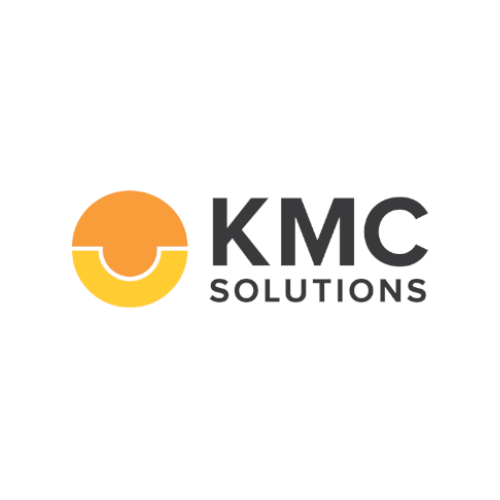Finding out how much recruiting software costs is no longer a simple task. Few vendors have transparent pricing and offerings are often tiered so that the features you really want cost extra.
To keep pace with the latest pricing data is a huge time investment. You'll need to dedicate time to vendor demos, seek advice from fellow HR pros, and hedge for hidden expenses like implementation fees, data migration costs, or premium support.
But we’ve got you covered! This guide compiles insights into the latest recruitment software pricing data. It’ll reveal not only the initial subscription costs but also the full expense of ownership. Better yet, you’ll get the tips and tricks needed to secure the best possible deal from the vendors.
How Much Does Recruitment Software Cost?
Recruitment software comes in a variety of pricing structures to cater to the diverse needs of businesses. The cost of recruitment software varies based on the size and requirements of your organization. Here, we break down the pricing considerations for different business sizes:

Small Businesses
Small businesses, often startups or teams with fewer than 50 employees, tend to gravitate towards SMB-centered ATS and recruiting solutions that prioritize essential features like job posting, career pages, interview scheduling, and integrations with LinkedIn and Indeed.
These plans typically offer limited user seats, streamlined functionality, or a scaled-down version of the software to keep costs in check while meeting essential requirements.
Subscription-based models or pay-per-user pricing are common in this category. Monthly fees can range from $15 to $200 per user, depending on the recruiting software features and level of customization required.

Medium-Sized Businesses
Pricing plans for medium-sized businesses (50-249 employees) often provide more user seats and a broader set of features compared to small business plans, but they don't need all the bells and whistles required by larger corporations.
Pricing for medium-sized businesses often falls in the range of $150 to $400 per user per month. These businesses may need additional features such as a bigger number of active jobs, advanced reporting, integration capabilities, and more robust applicant tracking systems. Customization options are also more prevalent in this category.

Large Businesses
Large businesses (250-999 employees), tend to require comprehensive and full-cycle recruitment solutions. The cost of recruitment software for companies in this category can vary widely, often ranging from $400 to $1,000 per user per month or more.
This price bracket allows for extensive customization, high-level security, and the integration of complex Human Resource Information Systems (HRIS). You’ll see more references to custom packages (tailored per customers’ hiring needs) in this category.

Enterprises
Enterprises, with thousands of employees, have highly specialized and fully customizable recruitment software needs. Pricing for these organizations is typically not fixed and is negotiated directly with the vendor.
Costs can run into thousands of dollars per user per month, depending on the scale and complexity of the organization's recruitment requirements. These solutions offer advanced AI recruitment features, global support, and extensive compliance features.

Recruitment Software Price Comparison
Recruitment software with a free plan includes Zoho Recruit, Recruit CRM (whose free trial has no time limit), Loxo, and Breezy HR.
Recruiting software with a free trial includes Zoho Recruit, Loxo, Breezy HR, BambooHR (upon request), JazzHR, Recruit CRM, Teamtailor, Recruitee, Manatal, and Workable.
Since our last content update, Gem has discontinued its free plan for eligible startups and now offers a discount instead, while SmartRecruiters has ended SmartStart, its free version.
Below, you'll find some more detailed pricing info for recruitment software. Keep in mind that these are ballpark figures and the actual cost can depend on things like how big your organization is and specific features you require.
Types of Recruitment Software Pricing
Recruitment software pricing comes in several formats, with subscription-based, pay-per-user, tiered, and custom pricing being the most common.
Subscription-Based Pricing
Subscription-based pricing is a dominant model in the recruitment software market. Users pay a regular fee, often monthly or annually, to access the software. This model offers flexibility and caters to businesses of all sizes. It provides predictability in costs, simplifying budgeting.
Subscription fees can vary based on the chosen plan, encompassing features, the number of users, and support levels.
An example of this is Workable. They offer various plans tailored for businesses of varying sizes, encompassing features like applicant tracking, job posting, and collaboration tools.

Pay-Per-User Pricing
Pay-per-user pricing, as the name suggests, charges organizations based on the number of users or licenses they require.
This model is often beneficial for small to medium-sized businesses as it allows them to pay only for what they need. While this offers a transparent pricing approach, it may become cost-prohibitive for larger organizations with a significant number of users in their recruitment team.
Breezy HR is one of the recruitment software vendors that employ this pricing approach. Users pay based on the number of team members who need access to the platform.
This pricing structure makes the tool particularly popular among small to medium-sized businesses.

Be careful, though, because some vendors require a minimum billing amount. For instance, with Qandle, regardless of the plan you select on this recruiting platform, you will have to pay a minimum billing fee for 50 users.

Tiered Pricing
Tiered pricing involves offering different pricing tiers or packages with varying levels of features and support. This approach caters to organizations with different needs and budgets. Typically, there are basic, standard, and premium tiers, each with a corresponding price.
Greenhouse, for instance, utilizes a tiered pricing model to provide different packages with various features. Their pricing tiers include Essentials, Advanced, and Expert packages, allowing organizations to choose the level of functionality that best suits their needs.
Typically, entry-level packages provide a bare-bones version of the recruitment software while advanced features that HR teams covet, most would be in the top tier.

Custom Pricing
Custom pricing is often the choice for large enterprises with complex and unique requirements. Vendors work directly with these organizations to craft tailored solutions.
The cost of a custom recruitment software solution is determined through negotiation and is based on the specific features, integrations, and services the enterprise demands. This pricing model provides the highest level of accommodation to the company’s exact needs, thus resulting in higher expenses.
VidCruiter would be a perfect example of this. The vendor primarily offers custom pricing for their customers and typically hires at least 100 employees annually. They work directly with organizations to determine the cost, taking into account the specific requirements and scale of the enterprise. This approach provides a high degree of customization.

Free and Open Source
Some recruitment software options are open source or offer free versions with limited functionality.
While the initial cost may be low or $0, these solutions often require in-house technical expertise for setup and maintenance. Additional costs may be incurred for support, customization, or scaling to meet growing needs.
Odoo, for instance, is an open-source applicant tracking system (among other things) that offers free access to its basic features. Users can download and use the software without upfront costs but may face expenses for customization, support, and additional features.

Freemium Models
Freemium models combine free access to basic features with the option to upgrade to premium versions with advanced functionality.
This pricing strategy allows organizations to start with minimal investment and expand their usage as they grow and require more capabilities. Freemium models are popular among startups and small businesses.
As an example, Zoho Recruit adopts a freemium model. They provide a free recruitment software platform with basic features for small teams and offer the choice to upgrade to paid plans for advanced functionality and support as needs expand.

Potential Additional Costs of Recruitment Software
Signing up for recruitment software is, in many cases, just the start. The full cost of ownership could go beyond the initial subscription, so it’s best to educate yourself and ask the vendor about additional fees before you commit.

Here's a breakdown of potential additional costs to be aware of:
Implementation and Onboarding
This covers data migration, system setup, and team training.
Onboarding costs can vary based on software complexity and support level. Qandle is one of the recruitment and HR software that charges a one-time implementation fee depending on the number of users and the modules you subscribe to.

Customization
Customization costs may arise when you need the software to adapt to your unique workflow or branding.
As an example, RecruitBPM’s customization services are available at an extra cost.

Unless you're catering to an enterprise or locked into a specialized recruitment workflow due to your industry or candidate requirements, extensive customization is rarely worth the outlay.
For small teams, consider setting up a recruitment and hiring funnel that neatly aligns with your recruitment software’s innate capabilities. This prevents software upgrades and package upgrades from leading to further costly customization.
Integration
Integrating the software with different applicant tracking software, HRIS systems, video interviewing tools, or business systems may incur additional expenses, depending on the complexity of the integrations required. PCRecruiter, for example, provides API contracts at $50 per month for their enterprise version.

Rising Subscription Fees
While subscription fees are a primary component of recruitment software pricing, be aware that software providers often adjust their pricing periodically due to factors like feature enhancements, inflation, and market demand.
For instance, back in Q4 2022, Recruitee’s cheapest plan was priced at $185 per month for 10 job slots.

Yet, in 2024, the price of this plan was up to $199 per month for 5 job slots, and in 2025, it increased to €270, or more than $300 per month.

Support and Maintenance
This can include technical support, updates, and access to customer service.
Costs can vary depending on the level of support required. For example, a dedicated account manager is an add-on feature offered to users of JazzHR's Plus or Pro Plans, priced at $119 per month.

Third-Party Services
Some recruitment software vendors offer third-party services like native ATS background checks, job board postings, and candidate assessment tests. These services come with their own pricing structures and can contribute to your overall recruitment costs.
For example, integrating SEEK with Greenhouse incurs a fee that will be invoiced by SEEK.

Data Storage and Backup
If your organization generates a significant amount of candidate and employee data through the software, you may need to pay for additional storage. For example, Zoho charges $4.60 per month for every 5 GB of storage space.

Also, there’s a fee of $11.50 for additional data backup.

Data Migration Costs
Data migration involves transferring existing data from old systems or databases to the new software.
Most of the tools work the way Recruit CRM does—they provide built-in Excel/CSV import tools and a resume parser so you can DIY your data migration. They also provide a paid service — you can hire their team of expert data migration engineers and let them do the work for you. This service is priced based on data volume and the complexity of the task.

Data Security
Ensuring data security and compliance with regulations, such as GDPR, Single Sign-On, and compliance report metrics, may require investments in security measures and certifications.
Training and User Adoption
Training costs can arise if your hiring team requires extensive upskilling to use the new software. In addition, you may need to incentivize adoption with internal marketing or related employee rewards.
Overages
Some software vendors charge additional fees for overages, such as exceeding the number of users, job postings, or assessment tests included in your subscription.
For example, Wild Noodle—a technical screening service company, caps the number of tests customers can conduct per plan. Additional tests that go beyond your subscription will be charged at $20 per test.

Another example is Loxo, which charges $100 for every 100 additional monthly connect credits.

Extra Features
If you need features beyond your base plan, these may result in added costs.
For example, besides the four subscription plans, Breezy offers SMS/Text Messaging, Candidate Match Score, or Incognito Apply as add-ons.

How to Maximize Recruitment Software ROI
To get the best return on investment (ROI) from buying recruitment software, choosing the right tool is essential.
Here's a step-by-step guide to help you pinpoint the optimal solution for your team and your recruiting needs. We’ve also outlined steps to ensure the software you choose starts paying for itself in time and recruitment cost savings right away.
Pre-purchasing Stage
Define Clear Objectives
Set specific and measurable objectives for your recruitment software based on your priorities.
Whether it's reducing the time to fill your job openings, improving the quality of hires, or enhancing the candidate experience, specific, measurable goals are the foundation for ROI success.
Use Reliable Sources
You can’t expect vendors to give you an unbiased opinion on whether their tool is suited to your needs. It’s not their job to be objective.
Ensure you have trustworthy third-party resources and advisors to guide your decision-making process. Reliable reviews provide insights into real capabilities and limitations, feature comparisons, and potential pitfalls to look out for in different recruitment tools.
Purchasing Stage
Book Vendor Demos
After narrowing down your options, make time for vendor demos. It’ll be worth the time investment to see tools in action and gain insight that is unique to your circumstances.
Asking pertinent questions during these demos ensures you gather comprehensive information about the software's capabilities.
Seek Industry Expert Advice
Don't underestimate the value of consulting experienced HR professionals. Their insights can reveal aspects of recruitment software options that you might have overlooked.
Sign Up for Software Trial Versions
Even if a vendor doesn't publicly offer a free trial, many are open to providing temporary access to their paid plan upon request.
Take advantage of these opportunities to experience the software firsthand and assess how it functions and improve your hiring process. It’s your chance to put the tool through its paces and identify limitations that would make it an unsuitable solution for your recruitment needs.
Besides having a look around the dashboard and menus, use the trial version to pull reports, run data imports, and build workflows. It might feel tedious, but discovering barriers at this point (before money changes hands) saves a ton of heartache down the road.
Pricing Negotiations
You’d be surprised by how many vendors are open to negotiating the price of HR Tech. Even if they’re not, asking for a discount doesn’t hurt.
Make sure you have the upper hand in negotiations by conducting competitor research, exploring alternative options, and securing favorable terms for long-term contracts. You can also sweeten the deal for the vendor by offering your company as a case study or contactable reference.
Consider All Stakeholders
A solution can't be considered robust if it brings convenience for the recruitment team but is a nightmare for candidates. Make sure the software benefits all parties involved in your hiring workflows, from hiring managers and talent acquisition specialists to job seekers.
To get multiple points of view, consult a representative from each department of your organization that would be affected by the tool's implementation. Your accounting department may have billing requirements. Your legal team may have specific requirements for background checks. Hiring managers may want certain pre-screening functionality, and so forth.
Post-Purchase Stage
Training and User Adoption
Allocate resources for comprehensive training and onboarding to ensure that your team can leverage the software's full potential. Software is only as effective as the users who operate it.
Ongoing Support and Updates
Stay up to date with software improvements and new features. Take full advantage of customer support services (e.g., account managers, chatbot, self-help docs) as well. These resources could be very helpful to address any issues and ensure smooth software operation.
Feedback Loop
Encourage feedback from your hiring teams and engage candidates to understand how the software is performing and where it can be further optimized.
Measure and Adapt
Keep a close eye on all costs associated with the software.
Continuously assess the value these costs bring in relation to your objectives. This helps you detect when to make adjustments or explore alternative solutions if the software falls short of delivering the expected ROI.
Recruitment Software Pricing Vendor Demo Questions
As mentioned earlier, vendor demos are a crucial part of the recruitment software provider evaluation process. But their power only is activated if we know how to make the most of them and ask the right questions.
Make sure you get clear answers to the following:
- Plan Comparison: Can you provide a detailed price comparison between your different plans or editions?
- Scalability: How does the pricing structure accommodate scaling our usage as our organization grows?
- Discount Opportunity: Are volume-based discounts available for larger user or candidate numbers? Can you reduce the monthly cost if we increase the contract duration?
- Another Discount Opportunity: Do you offer discounts for early-stage startups, non-profits, or educational institutions?
- Overage Charges: Are there overage charges for exceeding user or open job posting limits?
- Customization Costs: How does pricing change if we require customizations to align the software with our specific recruitment processes or branding?
- Integration Expenses: Are there charges associated with integrating the software with our existing HR Tech stack or business systems, and if so, how are these costs determined?
- Support and Maintenance: What is included in the support and maintenance fees, and how do these costs vary based on the level of support required?
- Third-Party Services: If we opt for third-party services, such as background checks or assessment tests, how are the costs structured, and can you provide examples of the available services?
- Data Storage: Is there a limit to the amount of data storage included in the subscription, and what are the costs associated with additional storage if needed?
- Price Increases: Can you clarify whether the pricing we agree upon is subject to future increases, and if so, what factors might trigger such increases?
- Contract and Renewal: What are the contract terms and renewal options? Is there flexibility in terms of the contract duration and associated pricing?
- Payment Terms: What are the payment terms and options available? Can we discuss payment frequency, such as monthly, annual, or other alternatives?
- Renewal Incentives: Are there incentives for subscription renewals and long-term commitments?
- Price Lock-In: Do you offer price lock-in guarantees to protect against unexpected price increases during the contract term?
- Additional Features: If we require additional features or services (e.g., resume parsing automation, referrals tool, candidate messaging templates) that are not included in our initial plan, how are these priced and integrated into our subscription?
- New Features: If new features are added to the software solution after our subscription starts, are these automatically included, or do they come with additional costs?
- Data Export Fees: If we decide to migrate data out of your system, are there any fees associated with data export services or support?
- Early Termination: Are there any contractual commitments or penalties associated with terminating the subscription early, and if so, what are the terms?
- Other Unforeseen Costs: Beyond the discussed fees, what are the potential additional costs we should be aware of?
Download the Demo Questions on Recruitment Software Pricing: Open as a Google Doc

Recruitment Software Pricing: Final Thoughts
A recruitment software vendor can change their pricing before you know it, so it's a smart move to return to this guide now and then. At SSR, we keep our HR Tech resources evergreen, so each time you revisit, rest assured that the content is fresh and up-to-date.
If you ever find yourself in need of assistance in selecting the right recruitment tech, don’t hesitate to reach out to our HR Tech experts for free 1:1 help or consult our HR Tech buyer guides.



























